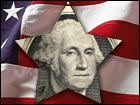|
Deficits seen through 2005
|
 |
November 29, 2001: 1:06 p.m. ET
White House budget chief blames recession, war on terrorism.
|
NEW YORK (CNN/Money) - President Bush's budget director expects the U.S. government to run budget deficits until at least 2005, the result of a sluggish economy and increased spending on defense and national security since the Sept. 11 terror attacks.
"It is regrettably my conclusion that we are unlikely to return to balance in the federal accounts before possibly fiscal '05," Mitchell Daniels, director of the White House Office of Management and Budget, told the National Press Club Wednesday. "Things will have to break right for us to do that."
The bleak prediction was the first public acknowledgment by the Bush administration that, after a string of four consecutive annual surpluses under President Clinton, deficits are back. Prior to the $69 billion surplus in fiscal 1998, the last federal surplus had been in 1969.
Though deficit spending is a possible political liability for President Bush and increases the likelihood of a return of partisan budget battles in Congress, economists think it likely will have little impact on the sluggish U.S. economy.
| |

|
|
| |
|
|
| |
The budget that we will be submitting just a couple months from now will determine whether we ever see another surplus.
|
|
| |
|
|
| |

|
|
| |
|
|
| |
Mitchell Daniels,
White House OMB Director |
|
"The reason we've shifted to deficit spending is largely due to a shift from very robust economic growth and a booming stock market into a recession," said Mickey Levy, chief economist at Bank of America. "The bottom line is, I'm not particularly concerned."
In the days after the Sept. 11 terrorist attacks, when President Bush and Congress began talking about spending many billions of dollars to fight a new war on terrorism and boost the economy, long-term interest rates rose as traders worried deficit spending would fuel inflation.
But the Treasury Department's decision on Oct. 31 to suspend the 30-year bond brought long-term interest rates back down. Continuing weakness in the economy - which slipped into recession in March, according to a report this week by the National Bureau of Economic Research - is likely to keep inflation fears at bay and interest rates low for some time.
"All else being equal, deficit spending would imply higher interest rates," said Scott Brown, chief economist at Raymond James & Associates. "But so many other factors - especially the sluggish economy - mean interest rates are going to be low."
With inflation a distant threat, the Federal Reserve has been free to slash its target for short-term interest rates a record-tying 10 times this year, to a 40-year low of 2.0 percent.
Meanwhile, Congress is struggling to put together a package of tax cuts and spending to spur economic growth. The House of Representatives passed a bill that favored tax breaks and other incentives for corporations. Supporters of this approach point out that the slowdown of the past year was largely due to anemic spending by businesses.
Detractors of that approach say consumers, whose spending accounts for two-thirds of gross domestic product (GDP), the broadest measure of the economy, need more help than businesses. After all, they say, businesses won't need to spend more to increase production until consumers are ready to buy their products.
Click here for CNNmoney.com's economic calendar
Either way, if Congress ever breaks its stalemate and agrees on a stimulus package, it will only add to the budget deficit. The $1.35 trillion, 10-year tax cut Bush pushed through Congress last spring further eroded the projected black ink.
Private and congressional analysts have been saying for weeks that they expect a deficit in fiscal 2002, which began Oct. 1, well into the tens of billions of dollars. Daniels provided no figure.
Underlining the dramatic economic turnaround, fiscal 2000 saw a record $237 billion surplus that shrank to a $127 billion surplus in fiscal 2001. As recently as August, the Bush administration predicted a 2002 surplus of $173 billion, down from its $231 billion forecast made in April.
In fact, until several months ago, most forecasters were envisioning an ever-growing string of budget surpluses for the next decade, fading only when the huge baby boom generation begins to retire.
To try to force a return to surpluses, Daniels said the administration would propose a fiscal 2003 budget early next year that is generous toward defense, anti-terrorism and other high-priority programs but seeks to trim programs that seem less necessary.
Daniels provided no examples, but such a proposal likely would face tough going from lawmakers eager to protect constituencies that currently receive such aid. Two-thirds of the $2 trillion annual federal budget -- including Social Security, Medicare, Medicaid, welfare and farm aid -- is for programs under which benefits are paid without annual congressional approval.
"The budget that we will be submitting just a couple months from now will determine whether we ever see another surplus," he said. 
- from staff and wire reports
|
|
|
|
|
|

|

